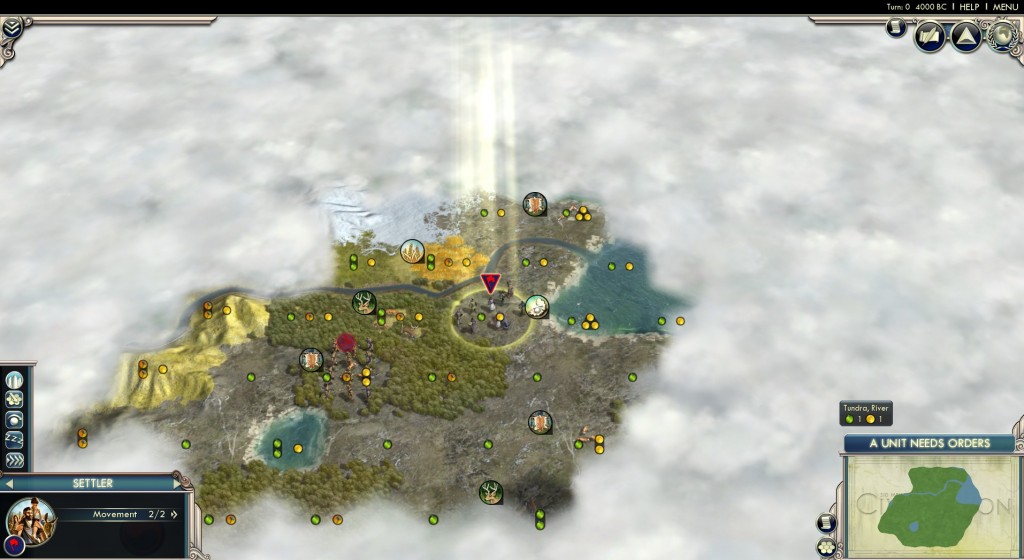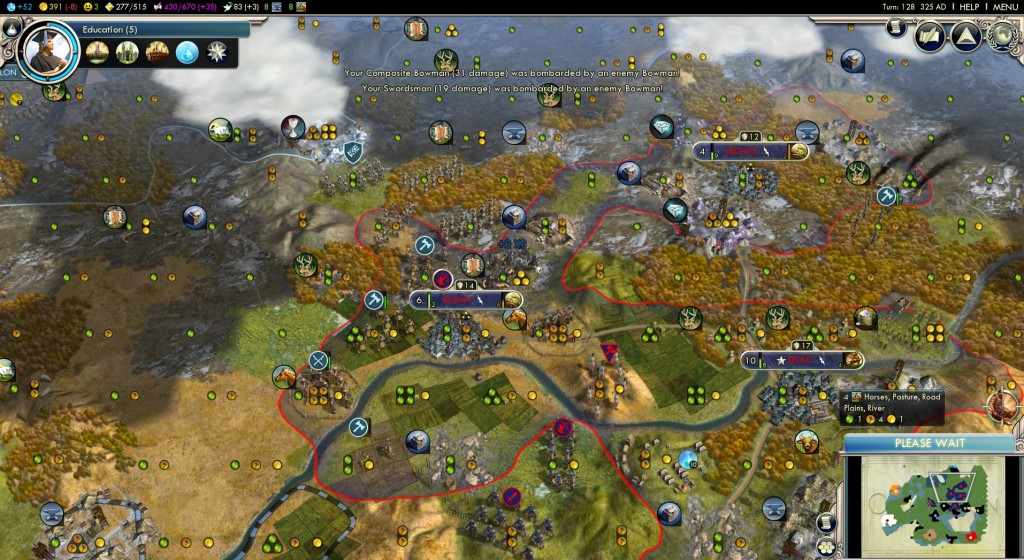
For years, new Civilization games (much like a certain other franchise) have followed a process of “two steps forward, one step back”. The original Civilization was a great and seminal game, but Civilization II surpassed it in every way. The third game was a low point in the series, but introduced a number of concepts followed up in the excellent IV. And while I liked V, my ultimate conclusion was that it “it’ll take a future Civ VI to build on the concepts and changes introduced by V.” How does the recent release of Gods and Kings, the expansion pack to V, change this?
To answer this question, I think it helps to split up what G&K offers into two categories. In one bucket, we can place the headline-grabbing features wholly new to V: new scenarios, espionage, and religion. Simply put, these are nice, but they’re not worth US$30 (let alone US$50, if you happen to suffer from regional pricing). In the other bucket, we can place the tweaks G&K makes to the core game: AI, diplomacy, units and technologies, and so on. These are the real draw.
Starting with espionage and religion, these two features are similar in that they both offer a handy set of bonuses, without reaching so far as to be game-defining. Espionage begins in the mid-game. When a civilisation begins a new technological era, starting with the Renaissance, it receives one spy who can be sent to a rival player’s city, sent to a city-state, or left at home for counterintelligence. Sent to another player’s city, a spy will provide line of sight and early warning about planned attacks, and every X turns, steal a technology (unless he/she is killed by a counterintelligence agent!). Sent to a city-state, the spy will gradually increase relations over time, and can be used to attempt a coup (a roll of the dice that will leave you with either a new city-state ally, or a dead spy). Simple, hands-off (none of the “fiddly agent” problem common to strategy games), elegant, but not decisive.

Religion, meanwhile, works off “faith points” which are primarily generated from buildings such as shrines/temples. The more faith points you accumulate, the more missionaries (spread your religion), inquisitors (quash other religions), and Great Prophets (do all the above, and also needed to found the religion!) you can deploy. Founding a religion allows you to pick and choose from a set of bonuses, some of which will apply only to you, some of which will apply to cities of any nationality that follow that particular faith. As only one civilisation per game can choose any given bonus, prioritising faith – and hence, that first Great Prophet – will allow the early bird to catch the worm. I think the importance of religion will depend on play style: I never found it that central, but I can see someone reaping dividends by taking a religion-centric civilisation (such as the Celts, who earn faith from forest tiles), then picking bonuses that allow, say, the purchase of pre-industrial units with faith.
Meanwhile, the two scenarios I tried (out of three* that shipped with the expansion) were a mixed bag. Steampunk scenario “Empires of the Smoky Skies”, despite its name, is a breath of fresh air. It’s quick to play: I finished in a single evening. Its mechanics are distinct; in particular, zippy research and construction, plus unique victory conditions, make it a builder’s paradise. And it has a sense of place, of steampunkish whimsy: it’s impossible not to grin when bartering anti-gravity ore with a goggled, top-hatted man named “Ignace Curnow”. In contrast, the “Fall of Rome” scenario was a disappointment. A purely military scenario with no diplomacy, no research, and no religion, it runs headlong into the “Civilization is not a wargame” problem that has dogged scenarios since Civ II.

Those are G&K’s most visible features. However, iceberg-like, its real significance is what lies below. Here are a few examples:
1) The computer player is cleverer (at least on land maps). Time after time, I’ve had to fight for my life – usually against early-game rushes, once against a late-game attempt to snatch up a diplomatic victory. In general, the AI hits the sweet spot where it can offer a thrilling game without actually making me lose. It did drop the ball in one game in which (a) the computer players all ignored the New World (this was a Terra map), and (b) the #1 player declared war on my horribly unprepared self… only to not lift a finger, not even posting a single soldier to our border! (The resulting war ended up one-sided, all right, but not the way I’d feared.) However, this match was very much the exception to a usually positive rule.

2) Diplomacy, though still not up to the heights the series reached in Civ IV, has improved to the point where the computer feels rational now. That’s more than most strategy games can say! The computer will ask for a cease-fire when it’s weary and throw in the towel (but without the ridiculously abject capitulations of pre-G&K) when it’s beaten. Even more importantly, it generally will not go to war without a sensible reason, such as border tension, and it can be deterred by a suitable show of force – in one game, the computer massed troops on our border while I was busy fighting another war, only to back down once I rushed an army home! Not only is this good strategy on the computer’s part, it does a lot to aid my suspension of disbelief and hence, my enjoyment.
3) The tech tree, the available units, and their upgrades are better designed. Remember the abortive archer upgrade path, or the ease of beelining for mechanised infantry (which made tanks redundant)? Gone. Games ending before I got a chance to play with aircraft and other late-game units? Well, now that G&K has added Great War-era aircraft, I have story after story to tell about how airpower transformed my campaigns. The effect was almost as steampunkish, and certainly as cool, as anything in Empires of the Smoky Skies! It’s not perfect – the devastating Gatling guns unlock a little too early – but it’s much better than what we had before.

I could list more incremental improvements. Refinements to one of Civ V’s best new features, city-state diplomacy. Notably faster performance on my computer. But the gist, I think, would be the same. The best reason to buy G&K isn’t to see spies, or prophets, or steampunk airships. The best reason to buy G&K is to see how it enables Civ V to realise its potential, and I think it’s telling that the more I played G&K, the more I liked it.
At the end of the day, my recommendation is straightforward. If you hated the base game, Gods and Kings will do nothing to change your mind. If you liked the base game, however, Gods and Kings is worth your cash. It offers subtle but real enhancements, and irons out several of the flaws that previously marred Civ V. Its more visible additions – espionage, religion, scenarios – are merely icing on the cake. A good expansion.
* Despite its historical setting, the third scenario, “Into the Renaissance” starts players with just one city and a settler! This didn’t quite appeal to me, though I may revisit the scenario in the future.
We hope you enjoyed this post! To quickly find this post, and our other reviews, click the “reviews” tab at the top of this page.
Resources
Buy Civilization V: Gods and Kings from Amazon.com
The four-city Tradition start, for use on Emperor and up. I’ll have to try this sometime!
The basis of my review
Time spent with the game: I estimate 30-40 hours.
What I played: One game on King as Austria (aborted). One game on Prince as Austria (won via the science victory). One game on Prince as Carthage (won, science). Two games on King as Korea (a pre-G&K civilisation) (won, science). One attempt at the Fall of Rome scenario (aborted). One attempt at the Empires of the Smoky Skies scenario on Emperor (lost). These were mostly on land-heavy maps: Continents, Terra, and Europe.
What I didn’t play: The “Into the Renaissance” scenario. The remaining difficulty settings and civilisations. Archipelago and similar maps.